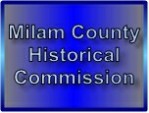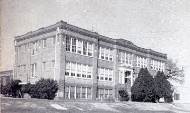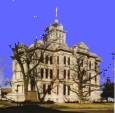Milam County Historical Commission
Milam County, Texas
Milam County, Texas






He Soldiered with Henry M. Stanley
John Sharpe, in Dallas News, December 27, 1925
Published in Frontier Times, February, 1926
It is not often that we find a man who through all the achievements of a busy life has
steadfastly remained a farmer. That, however, is the position of Col. James Henry
Faubion, of Leander, Williamson County, who is at once a farmer, a pioneer, a statesman
and patriot. Quietly at the age of 81 years, this beloved and honored citizen lives
with his two daughters n his valuable farm where all of his seven children were born.
His life has been a busy one and a blessing to his country, state and nation. He has
served her as a soldier, in legislative halls and as a pioneer justice of the peace,
county commissioner and supervisor of roads and most of all as a true citizen who has
been upstanding for the fundamentals and sensible applications of democracy in
government.
Col. Faubion was born at Newport, Cooke county, Tenn. Aug. 20, 1844, and arrived in
Georgetown, Texas, Dec. 24, 1865, coming here from Greenville, S. C., after having been
paroled from the Confederate army at Kingston, GA. He later went to Milam county where
he spent one year and then moved to Leander where he has since resided. At first he
rented land with his uncle John Faubion, Sr., then purchased the place on which he
continues to reside. He married Miss Margaret C. Mason, December 30, 1869, who has
been dead for a number of years now. He has seven children, E. M Faubion, of Houston;
O. E. Faubion, of Temple; Mrs. Lelia McBride of Leander; Mrs. W. B. Stanfield, of
Fowlerton and Misses Maud and Kate Faubion who make their home with their father.
Col. Faubion joined the Confederate army immediately on the declaration of war and
served throughout that struggle taking part in many of the battles. He was sergeant of
Company C, 26th Tennessee Infantry, and is the only survivor of his company and one of
only four of his command, the division was shot to pieces in a number of fights and at
one time only a handful escaped and Col. Faubion being one of them joined a pick-up
company and followed on in the running battle which followed. Col. John M. Lillard
was his first divisional commander. He was captured at Fort Donaldson, Tenn., and was
taken to Camp Morton as a prisoner of war, remaining eight months. After the battle of
Vicksburg, he was exchanged and re-entered the service. He was again captured at
Bluntsville, Tenn., and there he escaped from his guards before reaching prison. He
rejoined his regiment and served through the campaign which swept through Georgia,
Tennessee, Alabama, being the fifth Tennessee regiment at the close of the war.
In 1873 Col. Faubion was elected justice of the peace and county commissioner, which
office carried with it the further duties of assessor of taxes and road supervisor.
Judge Sidney Seymour was at that time chief justice; there were no county judges. When
he assumed his duties as justice of the peace, tax assessor, road supervisor and county
commissioner, Col. Faubion states Williamson county script was worth 10 cents on the
dollar. He states that Dr. Sam Houston, Jr., son of General Sam Houston, was county
physician at that time. He also says that many bills were presented the court the
first time it assembled and among them $1,000 for building the first court house of
the county. The court concluded that the bill was an imposition as the first court
house had been builded in 1848, and refused to pay it.
In 1885, Col. Faubion was elected to the legislature of Texas and served through the
19th, 20th, 21st, 22nd and 23rd sessions during which time he was chairman of a number
of committees.. He recalls the services of L. L. Foster, John H. Cochran, and Speaker
Alexander as the speakers of the house in those days.
In 1905, he was elected to the state senate and served in the 28th session in the upper
house.
Not only is Col. Faubion a pioneer farmer, stockraiser, legislator, senator and county
official but he is also a pioneer in newspaper work having been a regular contributor
to the Williamson County Sun since its establishment in 1877. He at one time edited
the Liberty Hill Curant and later the Leander Times, each of which papers were among
the first established in smaller towns of this state.
Of all the important positions Col. Faubion has held during his eventful life, the most
appreciated perhaps is the office of president of the Williamson County Old Settlers’
association which he has filled with credit to himself and the association for many
years. He is the second man to have held that office during the 21 years of its
existence as he succeeded Col. W. K. Makemson, its founder , at his death. He is
greatly beloved by the membership.
Reminiscently Col. Faubion has informed this writer from time to time that when he
moved to Texas Williamson county had a wonderful supply of wild deer, prairie chickens,
quail, wild turkey and kindred game. There was no such thing as a wire fence and the
country was open and regarded as a free range. He saw the rich prairie land around
Georgetown, Taylor and Granger raise from $2 per acre before the day of barbed wire to
its present high value much of it worth $500 per acre. Land in the timber where rock
or rails were available was worth much more money in those days.
Col. Faubion tells yet with a shudder of the terrible casualty list in his company at
the battle of Murffersboro, Tenn., when after the battle in calling the names of the
companies when his was reached his captain said all are slaughtered.
“He was wrong,” Col. Faubion says “for me and a few more of the boys had come through
that fire which was nothing short of a miracle.”
Col. Faubion says there has been but one mystery in his life that he could not solve
and that was whether or not he was correct in his deductions as to a ‘buddie’ he had
once during the war. He has always believed and does yet that a man attached to his
regiment and company at one time was Henry M. Stanley, later of African fame. He says
the man had the same name, he looked like the pictures of Stanley and at the same time
was a soldier of fortune. He believes sincerely that his comrade was none other than
Mr. Carter.
.
All credit for this article goes to
John Sharpe
Dallas News
and
Frontier Times
John Sharpe
Dallas News
and
Frontier Times